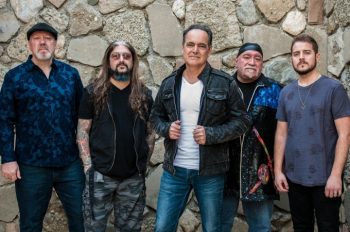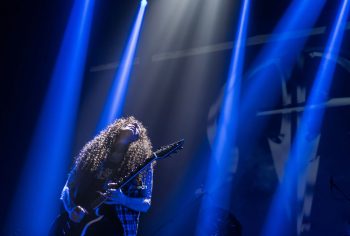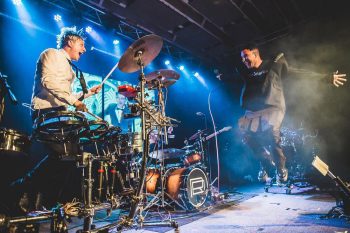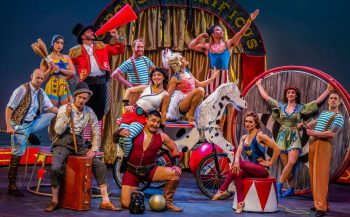By Denny Dyroff, Entertainment Editor, The Times
The last time Neal Morse played a show in the area was a year ago when he visited the Sellersville Theater on his solo acoustic tour.
That tour was sandwiched between a 2017 tour in support of a massive project – an intellectually challenging double-CD titled “The Similitude of a Dream” – and his current tour in support of a massive project – an intellectually challenging double-CD titled “The Great Adventure.”
“The Similitude of a Dream,” which was released on Radiant Records via Metal Blade Records/Sony with a running time of more than 100 minutes, is loosely based on the book “The Pilgrim’s Progress.”
“The Great Adventure,” which was released January 25 on Radiant Records via Metal Blade Worldwide, is a perfect companion piece to TSOAD’s partial retelling of John Bunyan’s “The Pilgrim’s Progress.” It has everything that fans would expect from an album by the Neal Morse Band — rock, metal, classical and jazz elements.
The 2017 band tour touched down locally at the Keswick Theater (291 N. Keswick Avenue, Glenside, 215-572-7650, www.keswicktheatre.com). On February 16, Morse and his band will return to the same venue to offer his fans more music based on “The Pilgrim’s Progress.”
“It’s really quite a thing,” said Morse, during a phone interview Monday morning. “What I’ve discovered – if the piece is right, it will deliver every night. ‘The Great Adventure’ is one of those pieces that delivers every night. And, it’s great to be out with this band. We’ve been together since 2102.”
The music made by the Neal Morse Band will never be classified as “easy listening” music.
That’s not to say the music made by Morse and his stellar group of players is not enjoyable because it is fun to listen to. But, grasping the complexity of the music and following along with the stories in the lyrics is not so easy. Actually, it takes work on the part of the listener.
The Neal Morse Band — singer/guitarist/keyboardist Neal Morse, drummer Mike Portnoy, bassist Randy George, keyboardist Bill Hubauer and guitarist Eric Gillette – have treated fans to a pair of musically and lyrically deep double-CDs.
Both double albums are loosely based on the book “The Pilgrim’s Progress.”
Officially titled “The Pilgrim’s Progress from This World, to That Which Is to Come.” is a 1678 Christian allegory written by John Bunyan. It is regarded as one of the most significant works of religious English literature, has been translated into more than 200 languages, and has never been out of print.
With “The Similitude of a Dream,” the entire book is presented as a dream sequence narrated by an omniscient narrator. The allegory’s protagonist, Christian, is an everyman character, and the plot centers on his journey from his hometown, the “City of Destruction” (“this world”), to the “Celestial City” (“that which is to come” — heaven) atop Mount Zion.
True to the album’s title, the creative process was indeed a “great adventure.” Unlike many previous Morse albums, which have often been written and arranged within weeks, this time around these prolific and world-class musicians spent almost a year working on the end result, producing an abundance of top-quality material.
“We recorded ‘The Great Adventure’ in 2016,” said Morse. “None of us really wanted to do a sequel. I had two songs that were in the vein of ‘The Similitude of a Dream’ and it went from there. It was a long process involving every member of the band. It took us one-and-a-half years to complete it.”
A key question that had to be addressed in the studio was how to pull all the ideas together into a coherent whole. In the end, what unlocked this “adventure” for Morse was the realization that “The Great Adventure” needed a new voice and perspective. This time, it is that of the Pilgrim’s abandoned son — a younger, perhaps angrier, voice than was heard on “The Similitude of a Dream.”
“We got together – in the same room at the same time — and had the first session in August 2017,” said Morse. “We record a single disc – a non-concept album in January 2018. But I didn’t feel it was right.
“After the January session, I got the concept of an angry son. That’s what clinched it for me. He exists in the novel but there isn’t much bout him. I circled back and went to the book and followed my instincts. I made up as lot of things as I told his story.
“We got together again in August 2018 to work on the double album. We left the session with the drum tracks complete. Then, we all went home to do overdubs.
“After that, we all just sent our stuff directly to our mixing guy Rich Mouser, who has a studio in Altadena, California. We got our parts in by the end of September and the mixing was done in October and November. It was cutting it close for a January 25 release.”
“The Great Adventure” is the ninth studio album with Morse, Portnoy and George, and the third as a true collaboration with this current lineup.
Morse has been a major player in the prog rock scene for the last two decades.
In the mid ’90s he formed the quirky Spock’s Beard, whose debut recording, “The Light,” was an unexpected success. Over the next seven years, Spock’s Beard released six critically-acclaimed studio recordings and multiple live recordings while establishing a passionate fan base in the prog rock community.
In 2000, he formed the prog supergroup Transatlantic with drumming legend Mike Portnoy (formerly with Dream Theater), Marillion’s Pete Trewavas and The Flower Kings’ Roine Stolt.
In 2001, Morse became a born-again Christian, left Spock’s Beard and began a Christian rock solo career, releasing many progressive rock concept albums about his new religious faith. In the meantime, he continued to play with Transatlantic and formed three new bands, Yellow Matter Custard, Flying Colors and The Neal Morse Band.
“I started going to church with my wife in the church she grew up in,” said Morse. “After a while, I experienced something I had never experienced before. I experienced the Holy Spirit.
“I quit Transatlantic and initially lost about half my fans because of the switch. Ultimately, I gained some. I gave my life to God and I’m happy with what we have.”
Now, Morse is challenging his fans with his second weighty double album in the last few years.
“Normal music fans might not listen to a project like this all the way to the end, but prog fans will,” said Morse. “In the prog world, the longer it is the better it will sell. They want the picture book and they’re really ravenous for the music.”
Video link for Neal Morse Band – http://youtu.be/hcq6xc26WQI.
The show at the Keswick Theater on February 16 will start at 8 p.m. Ticket prices range from $29.50-$65.
Another show at the Keswick Theater this weekend will feature Jack Hanna on February 17.
Marty Friedman began his career as a Shrapnel solo recording artist and later recruited a then 17-year-old Jason Becker to form the yet unrivaled dual guitar unit, Cacophony. Amassing worldwide acclaim as a guitar superstar, he came to the attention of Megadeth. His time as lead guitarist for Megadeth spanned nearly the full decade of the 1990s.
Racking up sales of over 10 million records with Megadeth, Friedman continued to record solo records, often embarking on adventurous musical forays far removed from his work with Megadeth, including an album with Golden Globe winner Kitaro. In a bold move, he left the legendary Megadeth to pursue new musical goals and has succeeded tremendously.
In a move even bolder than leaving one of the most popular metal bands in the world, Friedman made an even bolder move. He relocated to Japan in 2003 and has lived in Tokyo ever since.
Fortunately for his fans stateside, Friedman never abandoned America. His 14th solo album, “ONE BAD M.F. Live!!,” was released October 19, 2018 on Prosthetic Records. It’s an all-out celebration of his music in its rawest form with his Japanese band which features the stunning female bassist Kiyoshi, wunderkind guitarist Jordan Ziff, and “The Animal” drummer Chargeeee.
Now, Friedman has come back to America for a stateside tour in support of his new album. The tour touches down locally on February 19 at The Voltage Lounge (421 North Seventh Street, Philadelphia, 215- 964-9602, www.voltagelounge.com).
“It’s a live album that was done in Mexico City in April last year,” said Friedman, during a trans-Pacific phone interview last week from his home in Tokyo. “I wanted to use Chris Rakestraw as the producer. He’s from Nashville and has a great remote recording studio. I just wanted to document this stage of my band’s formation.
“My band outshines me every night. You will fall in love with Kiyoshi`s stage persona and her playing. I have never seen or heard a bassist like her. Jordan follows in a well-documented tradition of mine, of only playing with super guitarists. Chargeeee will have you laughing as he seems to be straight off The Muppets, while effortlessly bashing through some quite complex drumming.”
“This is my fifth year with this line-up. I haven’t been in the studio lately. Now, we’re just playing live a lot – starting on the West Coast and working our way east. After making my last album, “Wall of Sound,” in 2017, I wanted to get away from the studio for a while. I like to stay on the road.”
Many successful American music acts prefer to live in the states and do an occasional tour in the Orient. For Friedman, it’s the other way around.
“I’ve lived in Tokyo for a while,” said Friedman. “I used to go there a lot on tour. I went there so many times in my career, I realized I liked the music scene in Japan much better. I wanted to contribute to the music scene over there.”
Friedman’s many accomplishments make him currently the only musician to be a fixture in the top class of the Japanese domestic as well as international music scene. Three performances on national TV with the Tokyo Philharmonic Orchestra and charting high with his own music and with Japan’s top artists, has spurred Friedman into new celebrity territory. He has appeared on more than 600 TV programs and become a staple on mainstream media in Japan.
His appearance as the star of a new TV comedy, “Hebimeta-san” (“Mr. Heavy Metal”) and its spinoff, “Rock Fujiyama,” which ran for six seasons, propelled him into the living rooms of Japan`s mainstream. Currently he is a constant fixture on Japanese television (appearing on hundreds of network programs of all types, and as the face of long running campaigns for Fanta/Coca Cola, Sumitomo Bank, Suntory etc.), as well as appearing in major motion pictures. He is also the author of two hardcover books in Japanese detailing his unusual views on the current Japanese music scene, as well as two best-selling manga-related books, which are both in their eighth editions now.
Friedman is the first and only foreign musician in history to play the Japanese National Anthem at a major sporting event. After writing two bestsellers in Japanese, collaborating with several top Japanese artists, recording #1 singles and several top ten singles, stadium/dome tours of Asia and appearing in two major Japanese motion pictures, he has established himself as a bona fide superstar in the Land of the Rising Sun.
“ONE BAD M.F. Live!!,” which was recorded live during his 2018 “Wall of Sound” tour on its final show in Mexico City at Centro Cultural on April 14, 2018, is fueled by his own brand of “feelgood aggression.”
According to Friedman, “This live album is a tip of the hat to the live albums that blew my mind when I was a kid. The musical content itself is modern and atomic-powered, but the presentation is decidedly old school. The pacing of the show, the audience participation stuff, the special live arrangements of the songs, these are the things that got me all jacked up as a kid.
“I like to give the audience the feeling that they are really getting something unique, something that only happens at their show, not just a recital of the songs exactly as they know them. There are lots of happy accidents, once-in-a-lifetime ad libs, things that could have only happened because we were high on that particular audience`s energy.”
With 14 albums to his credit, Friedman has a lot of songs to fill his set list.
“We do a lot from ‘Wall of Sound’ and a lot from ‘Inferno,’ my previous album that came out in 2014,” said Friedman. “We play everything that’s on the live album – and a lot of surprises. My band knows my entire catalog so it’s a little different every night. We like to keep the audience involved.”
Friedman’s fans who catch a show on this tour will find themselves realizing what Japanese fans have known for a while – Marty Friedman is “ichiban” (一番), which means “Number 1” in Japanese. It is used to describe something that is the best of something – such as Friedman’s artistry. Video link for Marty Friedman –http://www.youtube.com/watch?v=P5ExZGYrtwo.
The show at The Voltage Lounge, which has Immortal Guardian and Assayer as opening acts, will start at 8 p.m. Tickets are $20.
Other upcoming shows at The Voltage Lounge are Can’t Swim on February 16 and The Showcase on February 20.
On February 17, The Foundry at Fillmore Philadelphia (1100 Canal Street, Philadelphia, 215-309-0150, www.thefillmorephilly.com) will present a show by one of the brightest new pop vocalist prospects – morgxn.
When he was growing up in Nashville, the young singer with an expressive voice was known by everyone as Morgan Karr. After graduating from college, he pursued an acting career in New York and then relocated to Los Angeles to focus on his music career. A few years ago, he dropped “Karr,” went to one (lower case) name and replaced the “a” with an “x.”
Ever since he was a young child in Nashville, morgxn has been singing – from a kid singing popular songs around the house to a member of local gospel choirs.
“I had to leave home to find my own home,” said morgxn, during a phone interview Wednesday from a tour stop in upstate New York. “We’re in Buffalo now – snowy Buffalo. It’s cold outside but it’s warm inside.
“I never really fit in when I lived in Tennessee. Nashville was a hard place to grow up as an outsider. Moving to L.A. was a fresh start. I need to find my own place.I moved to L.A. eight years ago and didn’t know anyone in the music scene.”
Once established on his own, morgxn started getting noticed in the music community – especially after he contributed vocals on two Tiësto tracks in 2015 – “Fighting For” and “Change Your World,” both of which were on Tiësto’s “Club Life: Volume Four New York City” album.
His debut single “Love You With the Lights On” was released in June 2016. He collaborated with Janelle Kroll on her 2017 single “Looose” and makes an appearance in the video (which led to a Billboard magazine article headline — “Indie Pop Upstart morgxn Debuts Stunning Single ‘Love You With the Lights On’.” morgxn’s 2018 single “Home” featuring Walk the Moon reached Number 19 on the Billboard Alternative Songs chart and Number 25 on the Billboard Rock Airplay chart.
In May, morgxn’s first album, “Vital,” was released on Hollywood Records. Just over a month ago, morgxn made his national television debut on on Jimmy Kimmel Live! when he performed “Home” with Nicholas Petricca, frontman of alt-rock band Walk the Moon. He also performed “Me Without You” in the same Kimmel episode. morgxn’s dynamic duet “Home” with Petricca is currently #19 on the alternative radio charts.
At the same time, morgxn announcing a five-track EP – “vital : blue (s t r i p p e d),” which includes stripped versions of his debut album “Vital” along with a brand-new track with Nicholas Petricca called “Blue.”
“I’m doing a month-long tour around the EP,” said morgxn. “I just put my album out, so I’m playing to new people in new places. The album came out last summer and the EP just came out.
“I really didn’t plan to do the EP. I’m very proud of the album. It’s the soundtrack to the last few years of my life – including losing my father. It’s really hard for me to put as period on anything. The album was finished – but it never felt complete.
“I got involved with the youth at Covenant House in L.A. I playd ‘Carry the Weight’ – just me on piano – and everyone was crying. ‘Carry the Weight’ was the start of the EP and then HBO picked it up for their ‘Pride’ campaign
“I’m working now on my next album. Music makes me very excited – music I’m bringing to you.”
Video link for morgxn — https://youtu.be/8NLLaG7OgSM.
The show at The Foundry, which has Robert DeLong as the headliner, will start at 8 p.m. Tickets are $16.
Other upcoming shows at The Foundry are Function on February 16, and Chiddy Bang on February 20.
The circus comes to town quite often in this area with annual visits by companies such as Cirque Italia, Cirque du Soleil, UniverSoul Circus, and Cirque Dreams.
This weekend, area circus fans will have the opportunity to check out a new circus making its first visit to the Delaware Valley.
On February 17, the Annenberg Center (3680 Walnut Street, Philadelphia, https://annenbergcenter.org/events) is presenting a performance by Cirque Mechanics – “42FT — A Menagerie of Mechanical Marvels.”
Cirque Mechanics was founded in 2004 by Boston native and German Wheel artist, Chris Lashua, after the success of his collaborative project with the Circus Center of San Francisco, Birdhouse Factory. Cirque Mechanics quickly established itself as a premiere American circus, with its unique approach to performance, inspiring storytelling and innovative mechanical staging.
Although inspired by modern circus, Cirque Mechanics finds its roots in the mechanical and its heart in the stories of American ingenuity. The shows, rooted in realism, display a raw quality, rarely found in modern circus, that makes their message timeless and relevant. The stories are wrapped in circus acrobatics, mechanical wonders and a bit of clowning around.
While “42FT” might sound like a strange name for a show, there is a lot of meaning behind the name.
A circus is a company of performers who put on diverse entertainment shows that may include clowns, acrobats, trained animals, trapeze acts, musicians, dancers, hoopers, tightrope walkers, jugglers, magicians, unicyclists, as well as other object manipulation and stunt-oriented artists. The term circus also describes the performance which has followed various formats through its 250-year modern history.
Philip Astley is credited with being the father of the modern circus when he opened the first circus in 1768 in England.
After a spell in the army, Astley opened a riding school in Lambeth where he taught in the morning and performed equestrian tricks in the afternoon. Musical accompaniment was provided by Astley’s wife Patty who beat a big drum. They established Astley’s Riding School at the southern end of Westminster Bridge in 1768 and Patty joined Philip in executing tricks on horseback.
One of Patty’s best tricks involved circling the ring on horseback with swarms of bees covering her hands and arms like a muff. Philip’s most famous act was “The Tailor of Brentford” in which he was the first to combine comedy with equestrian expertise.
Astley quickly began to incorporate other acts from the fairs and pleasure gardens of London and the boulevards of Paris. These were acrobats, jugglers, rope-dancers, clowns and strong men. By 1780 he had built a roof over the entire arena so that his audiences could enjoy winter evening amusements.
Philip Astley is credited with discovering that the ideal size for a circus ring is 42 feet in diameter. This was the optimum size that enabled him to use centrifugal force to help balance on a horse’s back. As he rode at speed around the ring, he used gravity to push himself into the horse’s back and thus prevent a nasty tumble onto the sawdust floor.
As styles of performance have developed since the time of Astley, so too have the types of venues where these circuses have performed. The earliest modern circuses were performed in open air structures with limited covered seating. From the late 18th to late 19th century, custom-made circus buildings (often wooden) were built with various types of seating, a center ring, and sometimes a stage. The traditional large tents, commonly known as “Big Tops” were introduced in the mid-19th century as touring circuses superseded static venues.
These tents eventually became the most common venue and remain so to the present day. Contemporary circuses perform in a variety of venues including tents, theatres and casinos. Many circus performances are still held in a ring usually 42 feet in diameter.
Chris Lashua, Creative Director/Founder of Cirque Mechanics, was discovered by Cirque du Soleil in 1992. Working for Cirque du Soleil, Lashua created and performed a BMX bike and a German Wheel act that were entirely his own and established his reputation as a visionary of circus gadgetry.
In 2004, his engineering skills and creative energy led him to form his own circus company — Cirque Mechanics. His innovative machines interact with acrobats, dancers, jugglers and contortionists on a 1920’s factory floor (Birdhouse Factory) and a “Gold Rush” era town (Boom Town). His machines also accompany world renowned symphonies (Orchestra Project), take place in a place inspired by his roots in cycling (Pedal Punk) and now under the “Big Top” in in “42ft-A Menagerie of Mechanical Marvels.”
“42FT — A Menagerie of Mechanical Marvels” follows the story of a down and out roustabout filled with wanderlust and enamored with the circus who is willing to persevere in order to reach his dream of performing under the big top. “42FT” displays life in a tent show by exposing the glamour inside the ring and the vitality of the back lot.
Lashua explained why he chose to develop a circus-themed show.
“I have been a circus fan my entire life. The circus has gone through a rough patch in the past few years and, while we are a contemporary circus company, we wanted to pay tribute to this classic art form — and Circus, as all art and entertainment, needs to evolve to remain relevant. This year also marks the 250th anniversary of what we all now call ‘circus’ and at the center of every circus has been the ring… 42 feet in diameter to be exact, the ideal measure for a rider to perform tricks while standing on a horses’ back while at a full gallop.”
While many circuses have folded because of backlash from their use of animals, Cirque Mechanics still uses an animal in its show –a mechanical horse named Rosebud. The rest of the cast features talented human circus performers.
“We have 12 artists on stage,” said Lashua. “While most are American, we do have one artist from a traditional Russian circus family and two male circus artists from Mongolia.
“As our shows are about creating mechanical devices that support the acrobats or show off the relationship between “man (or woman) and machine,” my favorite part is in the design and building of these original devices. I then get to work with artists to do acrobatic research, which is also great fun.
“We have a great central character and the audience will enjoy following him as he tries to prove himself worthy of a job in the circus. We also have a great high flying acrobatic ‘Russian Swing,’ which launches the acrobats 20 feet in the air, and a Mongolian Strongman who juggles a telephone pole as if it were a broom stick.
“My favorite is a juggling act that is performed atop our mechanical horse as it gallops around the ring…which is the perfect way for us to pay tribute to the animal act that is at the center of what we know as the circus. The reveal of “Rosebud,” our mechanical horse, with “rider” Tatiana Vasilenko is my favorite moment of the show. It celebrates the important role animals have played in circus history and highlights the machines that make Cirque Mechanics unique.”
Video link for Cirque Mechanics – https://youtu.be/Dy8QA1ALtVg.
The show at the Annenberg Center will be held on February 17 at 2 p.m. Tickets are $59.










